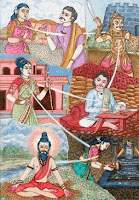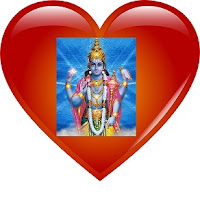5.
1.
Hey Bhgavan – Sriman Narayana with the six
qualities Shad Guna Roopam – Gnanam - knowledge), balam - strength aishwaryam - wealth, veeryam - valor, shathi - power and tejas - splendor
2.
Mama – my,me
3.
Dharme – the dharma as doing, yagna, and good
deeds providing water, planting trees etc.
4.
Astha na – have no liking
5.
Vasunichaye – money, wealth
6.
Kamopabhoghe – sensual pleasures
7.
Aastha na iva – do not have any liking at all
8.
poorva karmanuroopam – in accordance to my
previous deeds
9.
Yadyath bhavyam – whatever should happen
10.
Bhavathu – let it happen (but)
11.
Twat pada ambhoruha yuga gatha – The one that
the impressions of you lotus feet
12.
Bhakthi – devotion
13.
janma janamanthare api – birth after birth
14.
nishchala – firm, undoubted
15.
asthu – should be present
16.
ethath – ithi+ath – this only
17.
prarthyam – request, worthy of request
18.
mama bahumatham – my liking, I would like to
Hey Bhagawan I am not interested in good deeds (dharma
karyam) as doing yagnas, helping other people etc. that is supposed to take me
to heaven, I also do not have lust for wealth. I never ever have any
involvement or liking for sensual pleasures. Let everything happen in
accordance to my past deeds. I feel the only thing worthy of requesting you is
to bless me with firm, unshaken faith in you in all my brth after birth.
“Twatpadambhoruha yuga gatha nischala bhakthirasthu” can also be interpreted as
I should reach your lotus feet and be there forever.
6. Divi va bhuvi va mamastu vaso
Narake va
narakantaka prakramam
Avadhirita-sarada aravindau
Charanau the marane
api chintayami
Twat Charana aravindau sada chinthayami
1.
Narakantaka – one who ends life in hell
2.
Mama – for me
3.
Divi va – either in heaven (Swarga lokam)
4.
Bhuvi va – either on earth – bhoo lokam
5.
Narake va – or in hell
6.
Prakramam – in accordance to your wish
7.
Vasa: - life
8.
Asthu – happen
9.
Avadhirita-sarada aravindau – beauty of the lotus that blooms
in the autumn season
10.
Charanam – feet
11.
Marane api – at the time of death when all my
sense do not function also
12.
Chinthayami – I should think
Oh Bhagavan, Let it be your decision whether I happen to
live in heaven the place where we enjoy the fruits of our good deeds or hell
the place where we experience the
results of my bad deeds or on earth where one experiences the results of both
good and bad deeds . I am not happy or sad over that choice made by you. All I
request is that even at my death bed when all my senses including my sight and
muscular actions seize to function please bless me to think of your feet that
is as beautiful as the lotus that blooms in the autumn season.
Narakantaka – (as referred from vyakyanam by Kanchipuram
P.B.Annangaracharaiar Swamy) can mean as the one who can prevent going to hell
or the one who killed Narakasura
Narakasura being killed by Sriman Narayana who came on his garuda with Sathyabhama an incarnation of Bhooma Devi
Narakasura was born during perumals
Varaha avataram when perumal pricked Bhoomi Devi with his boar. As he was born
at an inauspicious time he had the qualities of an asura or a rakshasa. Living
in his kingdom of Pragjyotisha he
captivated the daughters of the devas, gandharvas and many princesses with the
intention of marrying them. Narakasura also carried away Lord varunas
umbrella, mandhakinis cliff
rathaparvatham and Athithi Devis’s earings. He was also waiting for an opportunity
to carry away Indras Iravatham elephant. Indra out of fear came to Lord Krishna
requesting for be help. Lord Krishna summoned his Garuda and came along with
his consert Sathyabhama who is the incarnation of mother earth Bhooma Devi to
the town of Prakjothisha and his ministers and others in his army and
eventually killed Narakasura himself with his Chakrayudham or the Sudarshana
Chakram. Lord Krishna also released all the 10,100 women, took them to Dwaraka
and married them.






















